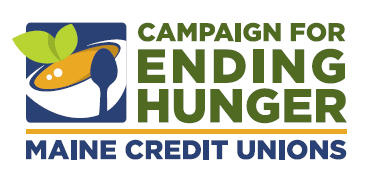Community Involvement

The Campaign for Ending Hunger
The Campaign for Ending Hunger is Maine Credit Unions’ signature social responsibility cause. Participating credit unions, including OTIS FCU, raise funds for the Campaign at various times throughout the year. All money raised is distributed to hunger organizations and food pantries throughout Maine. Funds raised by OTIS always remain local, and are disbursed by the Credit Union to local hunger organizations each year.
The Ending Hunger Committee at OTIS FCU is comprised of co-chairs Darice Roy, Executive Vice President; and Ryan Souther, Director of Digital Strategy & Facilities. Staff volunteer for fundraising events organized by the Committee year-round. Throughout 2024, the Credit Union held various fundraisers for the Campaign, including a book sale, plant sale, yard sale, candy sales, painting events, cornhole tournament, and a craft sale, among many others.

Statistics on Hunger in Maine
- Maine ranks 14th in the nation in food insecurity.
- Hunger and the risk of hunger are widespread among Maine’s low-income families with children.
- The likelihood of experiencing hunger or the risk of hunger is directly related to income.
- Children living in households which experienced hunger or the risk of hunger are more likely to experience health or school-related problems.
- Several groups are found to be at greater risk of hunger in Maine; children, adults in low-income families, disabled persons, persons with special needs, the elderly, those living in rural regions and the inner cities of Maine’s largest urban places.
- Several factors contribute to hunger in Maine; including income growth that is outpaced by cost of living; high level of underemployment; widening gap between rich and poor; illiteracy; and lack of consumer information on nutrition.
How to Directly Donate to the Campaign for Ending Hunger
To make a tax-deductible contribution to the Campaign, please visit OTIS FCU, or mail a contribution and make checks payable to:
Maine Credit Unions’ Campaign for Ending Hunger
ATTN: 2024 Campaign
PO Box 1236
Portland ME 04104
$30.9K
raised by OTIS in 2024
$1.3M
raised by Maine’s Credit Unions in 2024
$14.6M
raised by Maine’s Credit Unions since 1990
Donations & Sponsorships
During the course of the 2024 calendar year, OTIS FCU had the privilege of supporting a wide variety of worthy causes in our communities. Here are many of the organizations to which the Credit Union donated, and events which it sponsored.
2024 Recipients
- American Legion Post #10
- Area Youth Sports – Silver Sponsor
- Area Youth Sports Softball
- Canton Baptist Church Food Pantry
- Canton Historical Society
- Care & Share Food Closet
- Clearwater Ministries Food Pantry
- Farmington Elks Lodge
- Farmington Emblem Club
- Farmington Harness Horsemen Association
- FIRST Robotics
- Foster Tech Center Forestry/Woodharvesting Loggers’ Meet
- Franklin County Babe Ruth
- Franklin County Chamber of Commerce
- Franklin County Children’s Task Force
- Full Plates Full Potential
- Greater Androscoggin Humane Society
- Harris House
- HOLLANDSTRONG
- Jay-Livermore Falls Lions Club
- Jay-Livermore-Livermore Falls Chamber of Commerce
- Jay-Niles Memorial Library
- Lake Anasagunticook Association
- Leeds Community Church Food Pantry
- Lifeline for ME Recovery Center
- Livermore Area Recreation
- Maine Credit Union League
- Mission at the Eastward
- Norm Nolette Golf Tournament for Ending Hunger
- Olympia Snowe Women’s Leadership Institute
- Operation ReBoot
- Phillips Food Pantry
- Rural Community Action Ministry
- Safe Voices
- SeniorsPlus
- Sexual Assault Prevention & Response Services (SAPARS)
- Showtime Athletics Cheer & Dance Program
- Special Olympics
- Spruce Mountain Blues Bash
- Spruce Mountain High School Boys’ Soccer Boosters
- Spruce Mountain High School Envirothon Team
- Spruce Mountain High School Field Hockey Boosters
- Spruce Mountain Primary School Food Pantry
- Town of Hartford Food Bank
- Town of Jay – Music in the Park & BBQ
- Tri-town Ministerial Food Cupboard
- Turner Athletic Association
- Turner Food Pantry
- Turner Ridge Riders
- United Methodist Economic Ministry Food Pantry
- United Way of the Tri-Valley Area – Corporate Champion Circle
- University of Maine – ArtsFarmington
- W.G. Mallett School Food Pantry
- Western Maine Paper & Heritage Museum
- Wilson Lake Country Club
- Wilton Area Food Pantry
- Wilton Blueberry Festival
- Wilton Fish & Game Association
